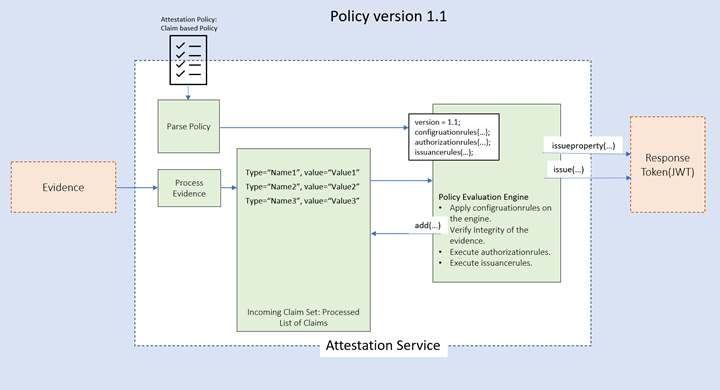Attestation policy version 1.1
Instance owners can use the Azure Attestation policy to define what must be validated during the attestation flow. This article introduces the workings of the attestation service and the policy engine. Each attestation type has its own attestation policy. The supported grammar and processing are broadly the same.
Policy version 1.1
The attestation flow is as follows:
- The platform sends the attestation evidence in the attest call to the attestation service.
- The attestation service parses the evidence and creates a list of claims that's used during rule evaluation. The claims are logically categorized as incoming claim sets.
- The attestation policy uploaded by the owner of the attestation service instance is then used to evaluate and issue claims to the response.
- During the evaluation, configuration rules can be used to indicate to the policy evaluation engine how to handle certain claims.
Policy version 1.1 has four segments:
- version: The version is the version number of the grammar that's followed.
- configurationrules: During policy evaluation, you might be required to control the behavior of the policy engine itself. You can use configuration rules to indicate to the policy evaluation engine how to handle some claims in the evaluation.
- authorizationrules: A collection of claim rules that are checked first to determine if attestation should proceed to issuancerules. Use this section to filter out calls that don't require the issuance rules to be applied. No claims can be issued from this section to the response token. These rules can be used to fail attestation.
- issuancerules: A collection of claim rules that are evaluated to add information to the attestation result as defined in the policy. The claim rules apply in the defined order. They're also optional. These rules can also be used to add to the outgoing claim set and the response token. These rules can't be used to fail attestation.
The following configuration rules are available to the policy author.
| Attestation type | ConfigurationRule property name | Type | Default value | Description |
|---|---|---|---|---|
| Trusted Platform Module (TPM), virtualization-based security (VBS) | require_valid_aik_cert | Bool | true | Indicates whether a valid attestation identity key (AIK) certificate is required. It's only applied when TPM data is present. |
| TPM, VBS | required_pcr_mask | Int | 0xFFFFFF | The bitmask for PCR indices that must be included in the TPM quote. Bit 0 represents PCR 0, bit 1 represents PCR 1, and so on. |
The following claims are supported as part of the incoming claims.
TPM attestation
Use these claims to define authorization rules in a TPM attestation policy:
- aikValidated: The Boolean value that contains information if the AIK certification has been validated or not.
- aikPubHash: The string that contains the base64 (SHA256) AIK public key in DER format.
- tpmVersion: The integer value that contains the TPM major version.
- secureBootEnabled: The Boolean value that indicates if secure boot is enabled.
- iommuEnabled: The Boolean value that indicates if input-output memory management unit is enabled.
- bootDebuggingDisabled: The Boolean value that indicates if boot debugging is disabled.
- notSafeMode: The Boolean value that indicates if Windows isn't running in safe mode.
- notWinPE: The Boolean value that indicates if Windows isn't running in WinPE mode.
- vbsEnabled: The Boolean value that indicates if VBS is enabled.
- vbsReportPresent: The Boolean value that indicates if a VBS enclave report is available.
VBS attestation
Use the following claims to define authorization rules in a VBS attestation policy:
- enclaveAuthorId: The string value that contains the Base64Url encoded value of the enclave author ID. It's the author identifier of the primary module for the enclave.
- enclaveImageId: The string value that contains the Base64Url encoded value of the enclave image ID. It's the image identifier of the primary module for the enclave.
- enclaveOwnerId: The string value that contains the Base64Url encoded value of the enclave owner ID. It's the identifier of the owner for the enclave.
- enclaveFamilyId: The string value that contains the Base64Url encoded value of the enclave family ID. It's the family identifier of the primary module for the enclave.
- enclaveSvn: The integer value that contains the security version number of the primary module for the enclave.
- enclavePlatformSvn: The integer value that contains the security version number of the platform that hosts the enclave.
- enclaveFlags: The enclaveFlags claim is an integer value that contains flags that describe the runtime policy for the enclave.
Sample policies for various attestation types
Sample policy for TPM:
version=1.1;
configurationrules{
=> issueproperty(type = "required_pcr_mask", value = 15);
=> issueproperty(type = "require_valid_aik_cert", value = false);
};
authorizationrules {
=> permit();
};
issuancerules
{
[type=="aikValidated", value==true]&&
[type=="secureBootEnabled", value==true] &&
[type=="bootDebuggingDisabled", value==true] &&
[type=="notSafeMode", value==true] => issue(type="PlatformAttested", value=true);
[type=="aikValidated", value==false]&&
[type=="secureBootEnabled", value==true] &&
[type=="bootDebuggingDisabled", value==true] &&
[type=="notSafeMode", value==true] => issue(type="PlatformAttested", value=false);
};
The required_pcr_mask type restricts the evaluation of PCR matches to only PCR 0, 1, 2, and 3.
The require_valid_aik_cert type marked as false indicates that the AIK certification isn't a requirement and is later verified in issuancerules to determine the PlatformAttested state.
Feedback
Coming soon: Throughout 2024 we will be phasing out GitHub Issues as the feedback mechanism for content and replacing it with a new feedback system. For more information see: https://aka.ms/ContentUserFeedback.
Submit and view feedback for
